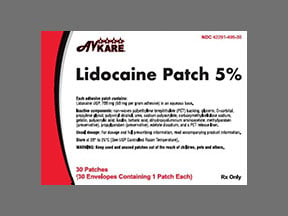
Lidocan Coupons & Savings Card – Discount Prices from $50.93
Brand for: Lidocaine
Lidocaine is a medication designed to alleviate itching and pain associated with specific skin conditions like scrapes, minor irritations, and insect bites. Additionally, it can be used to ease nerve pain following shingles, an infection caused by the herpes zoster virus. As a local anesthetic, Lidocaine functions by temporarily numbing the area where the patch is applied, providing relief from discomfort.
Our Lidocan coupons are free to use. You can print the coupon, email it to yourself, or receive the Lidocan coupon via text message. To get your free discount, show the pharmacist your Lidocan savings card which has the discounted coupon price. Use our filters below to edit the prescription box to match your needs. The Lidocan prices will update based on your prescription needs. Above our Lidocan coupons, you can change the location to see pharmacy prices in other areas. Our prescription discount card will update online with the specific pharmacy costs associated with your edits. Be sure to text, email, or print the Lidocan savings card code that you need after editing the prescription box and location field. Show the discount card to your pharmacist before paying.
My prescription
Edit
5%, Lidocaine (30 Patches)
Select pharmacy

CVS
$50.93
COUPON PRICE
Walmart
$58.32
COUPON PRICE
Albertsons
$58.54
COUPON PRICE
Walgreens
$67.20
COUPON PRICELidocan savings card
Show this card to your pharmacist
CVS
$50.93
BIN
ID
PCN
GRP
019876
LHF976878B
CHIPPO
LHX
Powered by
Lidocaine is a medication designed to alleviate itching and pain associated with specific skin conditions like scrapes, minor irritations, and insect bites. Additionally, it can be used to ease nerve pain following shingles, an infection caused by the herpes zoster virus. As a local anesthetic, Lidocaine functions by temporarily numbing the area where the patch is applied, providing relief from discomfort.
Our Lidocan coupons are free to use. You can print the coupon, email it to yourself, or receive the Lidocan coupon via text message. To get your free discount, show the pharmacist your Lidocan savings card which has the discounted coupon price. Use our filters below to edit the prescription box to match your needs. The Lidocan prices will update based on your prescription needs. Above our Lidocan coupons, you can change the location to see pharmacy prices in other areas. Our prescription discount card will update online with the specific pharmacy costs associated with your edits. Be sure to text, email, or print the Lidocan savings card code that you need after editing the prescription box and location field. Show the discount card to your pharmacist before paying.
More prescriptions for postherpetic neuralgia
coupons from$37.71Save 18%
coupons from$36.65Save 92%
coupons from$36.65Save 92%
coupons from$552.66Save 19%
coupons from$50.93Save 5%
coupons from$50.93Save 5%
coupons from$37.71Save 18%
coupons from$71.53Save 69%
More prescriptions for postherpetic neuralgia
Aspercreme Lidocaine Save 18%coupons from $37.71
Lyrica Cr Save 92%coupons from $36.65
Pregabalin ER Save 92%coupons from $36.65
Horizant Save 19%coupons from $552.66
Lidocaine Save 5%coupons from $50.93
Tridacaine Xl Save 5%coupons from $50.93
Zynalox Save 18%coupons from $37.71
Anecream Save 69%coupons from $71.53
Lidocan (Lidocaine) dosage forms
Use our Lidocan (Lidocaine) 5% coupon with prices from $50.93 for 30 Patches. You can also use our Lidocan (Lidocaine) 5% coupon with prices from $4.36 for 1 Patch. We have a Lidocan (Lidocaine) 5% coupon with prices from $8.08 for 3 Patches. You can use our Lidocan (Lidocaine) 5% coupon with prices from $11.80 for 5 Patches.
Dosage Quantity Price from Per unit 5% 30 Patches $50.93 $1.70 5% 1 Patch $4.36 $4.36 5% 3 Patches $8.08 $2.69 5% 5 Patches $11.80 $2.36 5% 9 Patches $19.25 $2.14 5% 14 Patches $28.55 $2.04 5% 15 Patches $30.41 $2.03
| Dosage | Quantity | Price from | Per unit |
|---|---|---|---|
| 5% | 30 Patches | $50.93 | $1.70 |
| 5% | 1 Patch | $4.36 | $4.36 |
| 5% | 3 Patches | $8.08 | $2.69 |
| 5% | 5 Patches | $11.80 | $2.36 |
| 5% | 9 Patches | $19.25 | $2.14 |
| 5% | 14 Patches | $28.55 | $2.04 |
| 5% | 15 Patches | $30.41 | $2.03 |
Lidocan FAQs
Using the SaveHealth discount card, what is the price of Lidocan without insurance?
Using the SaveHealth discount card, the price of Lidocan without insurance is $50.93.
What is the price of Lidocan at CVS?
The price of Lidocan at CVS is $50.93.
What is the price of Lidocan at Walgreens?
The price of Lidocan at Walgreens is $67.20.
What is the price of Lidocan at Walmart?
The price of Lidocan at Walmart is $58.32.
